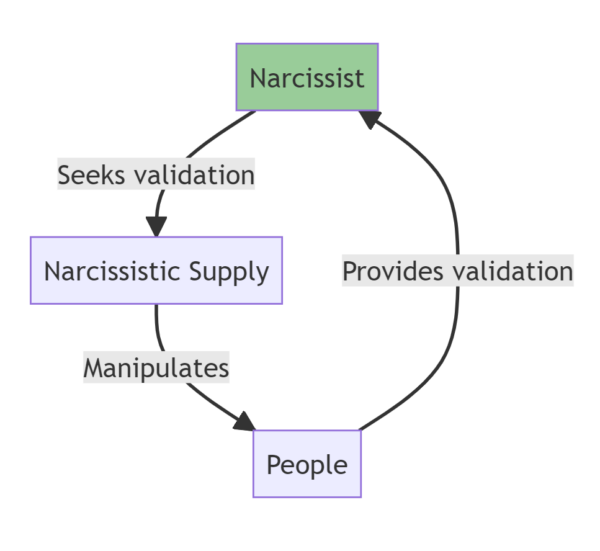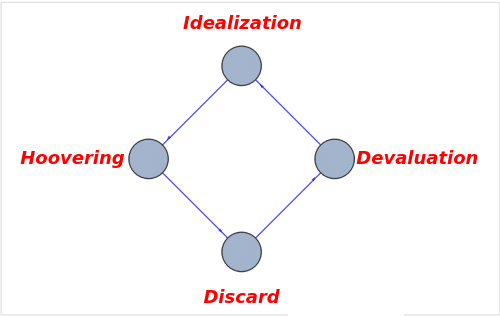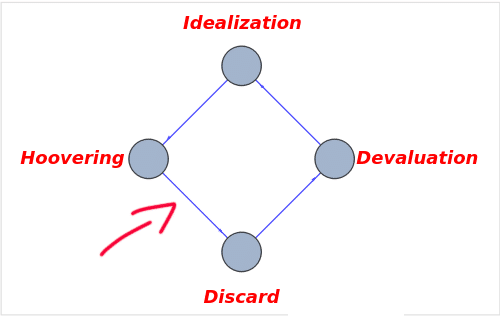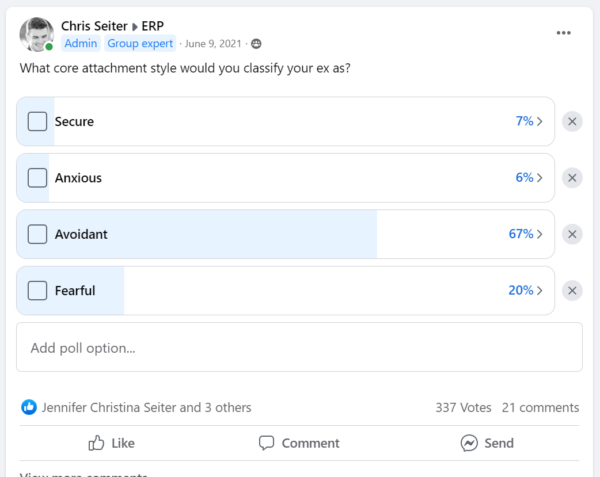Today we’re going to look at the major ways that a narcissist ex will behave (towards you) after a breakup.
In all, there are 9 behaviors that I think you need to be on the lookout for,
- You become part of their supply
- They’ll stick you in the abuse cycle
- They “need to win”
- They’ll play the victim
- Tirangulation
- Gaslighting
- Manipulate you through guilt
- Use a no contact rule on you
- They’ll have an internal narrative consistency
Let’s dive a bit deeper.

What Are Your Chances of Getting Your Ex Boyfriend Back?
Take the quiz1. You Become Part Of Their Rolodex Supply
With narcissists, a core mechanism that defines them is their constant need for something called narcissistic supply.
Think of this supply as the narcissist’s lifeblood. It can manifest in forms like admiration, physical intimacy between partners, and more.
Every narcissist has a specific supply quota they need to meet. Typically, they don’t perceive relationships as genuine connections with unique individuals whom they admire for their inherent qualities
. Instead, they view relationships based on what the other person can provide to replenish their narcissistic supply. This perception mostly operates subconsciously. However, after a breakup with a narcissistic ex, they usually reach out only when they sense their supply diminishing.
They might not be receiving the same level of supply from others, or perhaps what they get isn’t as fulfilling as what they received from you. I like to describe it as if they have an imaginary Rolodex in their mind, categorizing people based on specific needs.
For instance, they might use their friend Barry primarily as a workout partner, not because they genuinely appreciate his friendship, but because they need him as a spotter at the gym.
Similarly, they might label someone as a convenient contact for physical intimacy.
In the aftermath of breakups, a narcissistic ex may slot you into this Rolodex based on certain needs, whether that’s for emotional support, admiration, or physical benefits. This often leads to a cycle where they manipulate you for validation.
Once they extract what they need, they may either discard you or continue exploiting the relationship until their supply is replenished.
The danger with such individuals is their proficiency in deceit. They know precisely what to say to make you believe in their authenticity when, in reality, they’re merely seeking to replenish their supply.
2. They’ll Stick You In The Abuse Cycle
I’m going to assume that you’re already familiar with the narcissistic abuse cycle, so I won’t delve too deeply into this topic. However, it’s crucial to understand that narcissists typically ensnare individuals in a recurring cycle that follows these stages:
- Idealization: This is akin to the honeymoon period. Narcissists are experts at saying just the right things to draw you in, convincing you that the connection and feelings you share with them are unparalleled.
- Devaluation: Once they feel they’ve secured your commitment, they transition into the devaluation phase, where they belittle and undermine you, making you feel diminished and unappreciated, a stark contrast to the idealization phase.
- Discard: Eventually, they’ll push you away or abandon the relationship, at least temporarily.
- Hoovering: After the breakup, they might try to suck you back into the relationship or drama, especially if they feel they are losing control over you. This can involve seemingly heartfelt apologies, grand gestures, or emotional manipulation.
Interestingly, this abuse cycle correlates with the narcissistic Rolodex supply concept highlighted in the graphic provided earlier in the article.
The Rolodex supply model essentially depicts the transition between the discard stage and what is termed the “Hoover” stage.
Basically this process,
Happens right here,

What Are Your Chances of Getting Your Ex Boyfriend Back?
Take the quizOnce you offer the needed validation, they might momentarily revert to the idealization stage, making you feel valued again.
But inevitably, the cycle resumes with devaluation, discard, and so forth. This repetitive cycle can be mentally and emotionally exhausting to endure.
3. The Need to ‘Win’:
Narcissists often perceive relationships as a game in which they must emerge victorious.
For them, victory can manifest in various ways: swiftly entering a new relationship, showcasing their newfound partner on social media to evoke envy, or engaging in overt attempts to provoke jealousy.
I’ve witnessed this behavior firsthand.
As many of you know, we operate a thriving community for individuals navigating the tumultuous waters of breakups.
While our primary focus is to provide support during these trying times, we also specialize in assisting those hoping to reconcile with their exes. However, I want to be clear: we firmly discourage pursuing reunion with narcissistic exes.
Within our community, members share myriad experiences, offering a unique vantage point into the behaviors of narcissistic ex-partners.
One particularly jarring incident involved a female member resuming communication with her ex following a period of no contact. This ex, whom I believe exhibited strong narcissistic traits, sent her an explicit image of himself in the midst of a sexual act with someone else.
This wasn’t merely a benign photo of them together in bed; it was a graphic depiction. Shockingly, he had secured the consent of the other individual to capture and share this intimate moment. When our member posted about this incident in the community, it understandably elicited strong reactions.
Such extreme vindictiveness is rare, but it underscores the lengths to which some narcissists will go to assert their perceived dominance in the post-breakup landscape. They will resort to audacious measures just to convey the message that they are “winning” the breakup.
4. Playing the Victim:
A narcissist often portrays themselves as the injured party in the story of the breakup, amplifying their own suffering or detailing how they’ve been unjustly treated. This tendency is alarmingly prevalent.
We observe this behavior not just in narcissists but also in many exes who don’t necessarily exhibit narcissistic traits. Over time, I’ve pondered the reasons behind such conduct.
Two primary motivations seem to emerge:
- Ego Protection: Admitting mistakes or assuming responsibility for the dissolution of a relationship is daunting for many. Accepting blame demands a self-assessment of personal flaws and inadequacies, highlighting one’s misdeeds within the relationship. Given our intrinsic inclination to see ourselves as the heroes of our narratives, accepting that we may be the “villain” in certain chapters can be ego-shattering.
- Avoidance of Accountability: Adopting a victim role can conveniently deflect blame, allowing individuals to sidestep owning up to their misactions. This observation is particularly pertinent as our research at Ex-Boyfriend Recovery indicates that a majority of the exes studied exhibit avoidant tendencies.
Remarkably, over 60% of our clients believe their exes display avoidant behaviors.
Notably, a securely attached individual cannot be a narcissist. All narcissists inherently possess insecure attachment styles. Thus, the “playing the victim” stance, a classic dismissive avoidant tactic, aligns seamlessly with the coping mechanisms narcissists often employ.
5. Triangulation:
In essence, triangulation means that your ex might pull in third parties to validate their point of view.
By doing this, they aim to cast you in an unfavorable light or they might use these individuals to evoke jealousy in you. Their ultimate goal is to gain a type of social sympathy. Being perceived as the victim can elicit understanding and support from others.
This in turn gives them emotional validation and creates a supportive circle that backs their version of the breakup story. The bitter irony is that more often than not, they aren’t the real victims – you are, especially if you’ve been ensnared in the narcissistic abuse cycle which inherently places you in the victim’s position.
The proliferation of social media and the potential for stories to go viral complicates matters. While the cancel culture has its merits, one of its downsides is that people can be quick to form opinions without full information.
An intriguing example of this emerged recently, and while I’m still piecing it together, a situation from a show caught my eye.
As I was browsing Reddit, I came across a post about a participant from either The Bachelor.

What Are Your Chances of Getting Your Ex Boyfriend Back?
Take the quizAllegedly, he got someone pregnant. Now, I need to delve deeper for verification, but from what I’ve gathered, a woman claimed she was expecting a child with the former Bachelor, suggesting he was responsible.
Interestingly, their intimate encounters were limited to oral s*x, making her claim seem improbable. Yet, when she publicized her version, many quickly vilified the Bachelor without examining the full story.
This kind of reaction mirrors the triangulation method – seeking widespread sympathy to strengthen one’s position.
6. Gaslighting:
This is a manipulative technique where the narcissist tries to make you doubt your perceptions, memories, or feelings.
They might insist that events didn’t happen as you remember or deny their own hurtful actions.
Fun Fact: The term originates from the 1944 film “Gaslight,” where a husband manipulates his wife into believing she’s losing her mind.
In real-world scenarios, gaslighters might consistently challenge a person’s recollection of events, outright deny things they’ve said or done, or shift blame in subtle ways.
Over time, this can erode the victim’s trust in their own judgment and reality, leading to confusion, decreased self-esteem, and emotional dependency on the gaslighter.
This technique allows the manipulator to maintain control and avoid accountability, often keeping the victim in a state of uncertainty and vulnerability.
7. Manipulate You Through Guilt
This topic can be quite heavy, and though I’ve been hesitant to discuss such matters on the website, I’ve seen its occurrence frequently enough to address it.
A defining characteristic of narcissists is their compulsion to control others. They often recognize that guilt can be a powerful tool for manipulation.
Disturbingly, I’ve observed that they may exploit this by threatening self-harm.
The individual on the receiving end of these threats might feel obligated to adhere to the narcissist’s wishes or demands, fearing the consequences if they don’t.
Several factors drive a narcissist to resort to such tactics.
Their behavior may stem from attention-seeking tendencies, a desire for sympathy, or their incessant need for a narcissistic supply. This ‘supply’ might manifest in a perverse sense of control they feel when making others conform to their whims. By threatening self-harm or suicide, they can draw attention, elicit sympathy, and make a dramatic plea to be acknowledged and cared for. It’s their desperate bid to regain control.
This reminds me of an unsettling phenomenon I encountered in a documentary last year. It explored the sinister world of ‘swatting’, where individuals falsely report bomb threats, leading to large-scale evacuations and emergency responses.
A particular individual had orchestrated multiple such incidents nationwide, taking a twisted pleasure in the chaos he instigated. L
ike the narcissist, when they sense a loss of control over situations or individuals, they might resort to extreme actions. Whether it’s threatening self-harm or blackmail, they employ various manipulative tactics.
It’s for reasons like these (among others) that I firmly advise against rekindling relationships with narcissists. I often liken them to emotional terrorists. And as the saying goes, “We don’t negotiate with terrorists.” While this might not always hold true for the United States, it’s a principle we should abide by when dealing with emotional manipulators.
8. They May Use A No Contact Rule On You
It’s quite likely that a narcissist will use the no contact rule on you, especially if they’re aware that it’ll cause you distress and compel you to re-engage.
This tactic mirrors the passive-aggressive silent treatment and bears similarities to manipulation through guilt. The primary intent is to exert control over you.
However, it’s crucial to distinguish between our advocated no contact rule and the narcissist’s version.

What Are Your Chances of Getting Your Ex Boyfriend Back?
Take the quizIn our model, we advise clients to implement the no contact rule post-breakup for their own healing. It’s essentially pressing pause on the breakup dynamics, allowing the individual time to recover, and subsequently make a well-considered decision regarding their next steps. Conversely, a narcissist employs the no contact rule as a weapon to inflict pain, manipulate, and establish dominance.
Intent matters!
9. Internal Narrative Inconsistency
Narcissists often weave a continuous story throughout their lives, casting themselves as perpetual victims, not just in romantic settings but across various scenarios.
One of the challenges is that when you initially encounter a narcissist, they may appear flawless and present this victim narrative which you might initially accept.
But with time, you’ll begin to spot the cracks and inconsistencies in their tales. They can craft such convincing internal stories that they might even manipulate you into doubting your own perceptions.
For instance, I’ve encountered narcissists who’ve made outrageous claims like nobody has ever swum across the English Channel from France to England. Despite presenting them with concrete evidence to the contrary, they remain adamant or dismiss it as a conspiracy.
Narcissists consistently concoct these implausible internal narratives, often discordant with reality.




